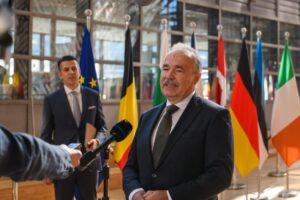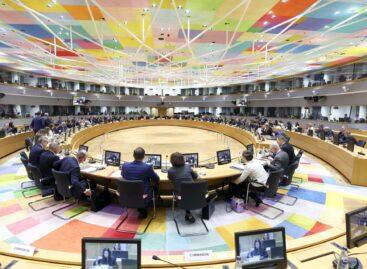The agricultural council must show the main directions of the agricultural policy after 2027
The aim of the six-month Hungarian presidency of the Council of the European Union is for the Council of Agriculture Ministers to show the main directions of the common agricultural policy after 2027 to the new European Commission, which will begin its work in the second half of the year, in the form of conclusions, the Hungarian Minister of Agriculture announced on Monday in Brussels.

(Photo: AM)
István Nagy emphasized to journalists after the council meeting of the agriculture ministers of the member countries: since according to the Hungarian EU Council presidency, the interests of the farmer must be placed at the center of agricultural policy again, the creation of a farmer-centered EU agricultural policy was included among the central priorities of the presidency. This, he says, carries a good message for European farmers. He reminded: the greyhound political priorities of the Hungarian EU presidency are built around five concepts: competitive, crisis-resistant, sustainable, farmer-friendly and knowledge-based agriculture. All legislative and non-legislative files scheduled for the next six months can be classified under these five priorities, he informed. He said that the majority of the member states supported the suggestion that the new European Commission should give priority to the agricultural and forestry sector in order for it to continue to be a cornerstone of a competitive, independent and prosperous European Union. The minister reported that before the council meeting, he had a meeting with the representatives of the interest protection organization of European agricultural producers (Copa-Cogeca). “We want a farmer-centered, farmer-friendly EU presidency and a common agricultural policy not only in words, but also in our actions,” he said. In this regard, he said, the representatives of the host organizations assured their support for the Hungarian priorities that they wanted to implement. István Nagy called the strengthening of the viability of rural areas and the management of demographic challenges an important objective, since – he emphasized – the depopulation of these areas shows a worrying trend in many member states. According to him, the ministers of several member countries suggested that in order to deal with short-term challenges, it would be necessary to ensure the advance payment of the increased amount of agricultural subsidies by the European Commission this year as well. He also called it important to preserve European food traditions, for which proper and non-misleading information of consumers, increasing their knowledge and awareness is essential. He said: there is a difference of opinion between the ministers in “how we look at food”: as a simple biological need, or as a complex issue, which also includes traditions, culture, ecological maintenance, the question of farmland, maintaining and cultivating the landscape . He said: Hungary supports the French initiative that proposes the creation of a committee that examines the social discussion, social acceptance, the possibility of introducing laboratory meat, and the effects of the introduction of such a product in the European Union.
In relation to the council debate on trade policy, István Nagy emphasized that it should be avoided that agriculture should once again pay the price of geopolitical tensions and disputes affecting other sectors. Regarding Ukraine, the Council of Agriculture Ministers will closely monitor the developments of the trade partnership between the European Union and Ukraine, including the implementation of the autonomous trade liberalization measure (ATM Regulation), he indicated.
Regarding the possibility of creating knowledge-based agriculture among the priorities of the Hungarian EU presidency, the head of the ministry highlighted: Hungary has set itself the goal of launching a research program organized around the needs of the Central and Eastern European region along four important themes. These include promoting healthy soils, fresh water, food systems and the creation of greater added value locally. He called it important that not only the member states, but also the Western Balkans, Ukraine and Moldova, which are awaiting accession, should be an integral part of the consideration for Eastern Europe. This region can greatly contribute to the security of European sovereignty and European food supply – stated István Nagy in his speech.
MTI
Related news
Ministry of Agriculture: the government is supporting the development of crop dryers with significant resources
🎧 Hallgasd a cikket: Lejátszás Szünet Folytatás Leállítás Nyelv: Auto…
Read more >Related news
High-value shopping basket and more conscious shoppers: growing demand for domestic and healthy products
🎧 Hallgasd a cikket: Lejátszás Szünet Folytatás Leállítás Nyelv: Auto…
Read more >







